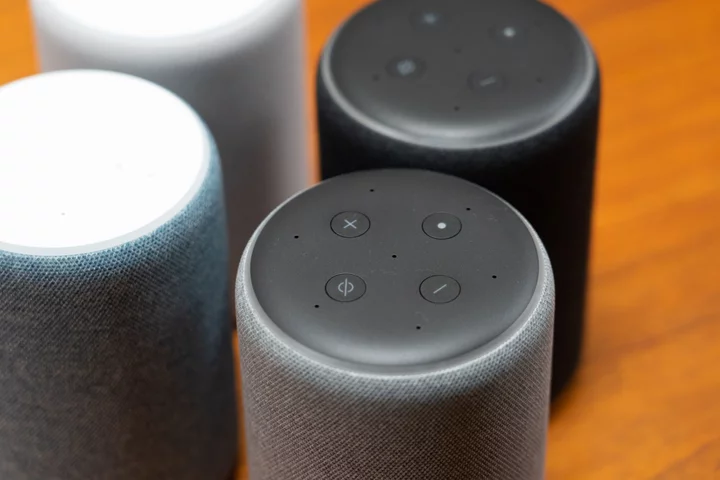Ask Amazon.com Inc.’s digital assistant, “Hey, Alexa, is Amazon a monopoly?’ and it will profess ignorance.
“Hmm, I don’t know that one,” it answers.
But ask about any of the other tech giants’ business practices, and it’s ready to critique them. Surfacing answers from across the internet, Alexa describes Apple Inc. as an “oligopoly” and cites Alphabet Inc.’s Google as violating privacy rights, according to Bloomberg News tests of the software on three devices.
Lawmakers and regulators have accused Amazon of using its commanding lead in the business of online retail to harm rivals and partners. The company is awaiting the results of a long-running US Federal Trade Commission investigation into its activities. Amazon has courted allies in Washington with tens of millions spent on lobbying and a small army of consultants and public relations professionals.
The company appears to have enlisted its popular Alexa assistant in its effort to protect the company’s reputation.
“Alexa uses a range of credible organizations and news sources to generate responses on any number of topics, including Amazon,” company spokesperson Kristy Schmidt said in a statement. “When we learn of incorrect responses to particular questions, we take a closer look and work to remove responses that are inaccurate or misleading. We do this for a range of topics, as we believe it benefits customers.”
Read More: Can AI Gain Sentience? Maybe, But Probably Not Yet
Users probably don’t consider digital assistants as primary resources for news and information about antitrust issues, but a Bloomberg test of the devices produced a variety of responses. Alexa, for example, won’t label Amazon a monopoly, but it tends to respond in the affirmative when asked the same question about Google, Meta Platforms Inc.’s Facebook, Microsoft Corp. and Walmart Inc.
When Alexa is asked if Amazon has broken antitrust law, it says, “I don’t have an answer to the question I just heard.” Google’s Assistant and Apple’s Siri, Alexa’s two closest competitors, each cite news stories on government antitrust lawsuits against their companies.
Siri, for the most part, offers up criticisms of the iPhone maker. But it evades at least one question about Apple’s power. When asked whether Apple is a monopoly, Siri often replies, “I can’t answer that, but Apple.com should be able to.”
Apple and Google declined to respond to requests for comment.
Alexa also cites alleged privacy lapses by its rivals, bringing up a Facebook privacy settlement with the FTC and allegations that Apple’s finger-scanning technology violates constitutional rights. When users ask whether Amazon violates users’ privacy, Alexa sticks up for its safeguards: “Amazon builds multiple layers of privacy protections into your Alexa experience.” It also links to an Amazon website with more information about Alexa’s privacy settings.
Earlier this month, Amazon agreed to pay $25 million to settle a complaint brought by the FTC over allegations that Alexa violated laws governing how companies must treat data gathered on children. Amazon denied wrongdoing, and said it disagreed with the FTC’s conclusions.
By default, Alexa’s speech-recognition algorithms aim to put questions into categories based on the user’s intent, and respond with information pulled from vast databases. Requests about the weather, music, or sports scores send the software searching for the answer using pre-programmed logic and data stores.
In response to many informational questions, Alexa tends to lean on data sources like Wikipedia, or, failing that, news stories retrieved from an internet search. The company also crowdsources answers through a program called Alexa Answers. (Asked if Google hurts its competitors, Alexa answered: “According to an Alexa Answers contributor: No,” without elaborating.)
This isn’t the first instance of Amazon pre-programming responses to controversial questions. In 2017, videos went viral of people asking Alexa whether the assistant worked for the CIA. The software initially declined to respond at all, making a digital ding that evoked a phone call dropping. That didn’t quell the curiosity, so Amazon changed the reply to “No, I work for Amazon.”
Alexa is also sensitive to questions about working conditions at Amazon. In response to a range of queries about Amazon employees – whether they are treated fairly, take rest breaks or paid time off, or have productivity targets – the software replies with the same outdated factoid: “As of December 2021, Amazon employed 1.608 million people.”

